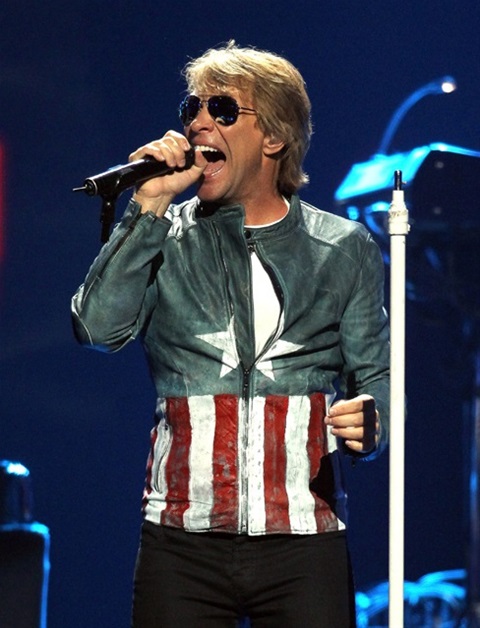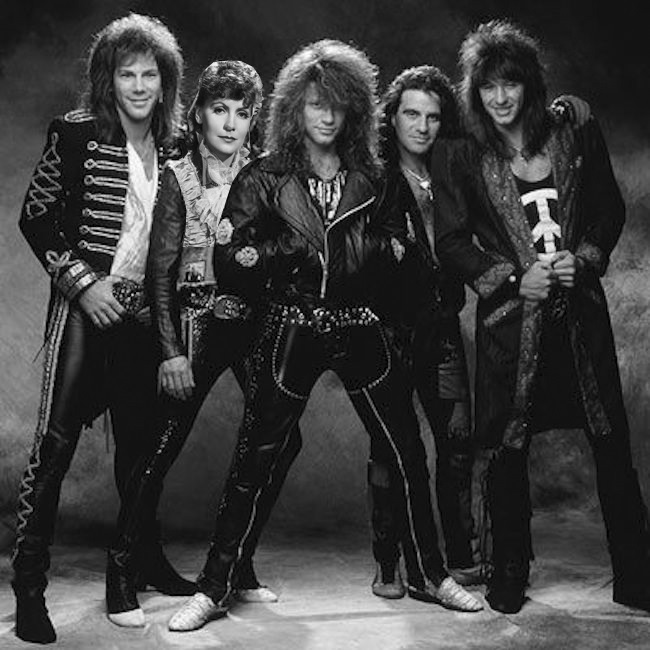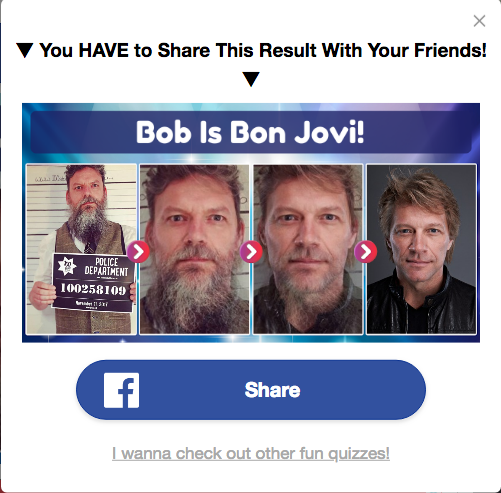Livin' On A Prayer
7th May 2018
Cycle six of twelve. Woah oh, we’re halfway there…
Here’s a picture of Jon Bon Jovi, patriotically emblazoned with the stars and stripes. He could only be more patriotic if he was holding an AR-15 aloft, straddling the crown of the Statue of Liberty, ringed by dead or dying schoolchildren dusted with the Colonel’s secret blend of eleven herbs and spices (pssst, don’t quote me on this, but I’m pretty sure it includes celery salt, paprika and a sprinkling of racism).
Anyway, I’ve always had a romantic attachment to Russia. I wonder why that is? I wonder what it is that draws my heart there? Maybe it’s partly fuelled by a political sensibility that can regale in the first days of the 1917 revolution as much as it can sink into despair when trying to disseminate what went wrong afterwards. Maybe it’s a history, unmatched in human suffering that awakens the vampire in us all. Maybe it’s because all that suffering has given rise to so much art that continues to resonate with me. Dostoyevsky, Turgenev, Chekov, Solzhenitsyn, Pasternak, Tolstoy…
Anna Karenina has remained a constant in my life. She’s always hanging around, draping herself over the furniture like a nuisance. I was reading AK when I made my first trip to Australia, to rekindle a love would lead to marriage. Later, my wife and I would fall upon the name for our second child as we retired after watching a stage production at the Dundee Rep. When we moved to Footscray, the ABC filmed a contemporary TV version around the streets where Bec worked. Anna, Levin, Vronsky, Kitty, Oblonsky, Karenina. They have all been reassuring companions with me through the years. A mere one hundred and forty five years after it's publication, it’s perhaps less reassuring to note that a woman is still judged by a different standard to a man, that indiscretions are forgivable in one sex but not another, that class is still a determinant of social status and that birth control and a woman’s right to choose is a bit politically risqué in so much of the developed world. We all have to be Realists these days.
It’s really not a great start to a blog entry to list your literary heroes. I can only disappoint you now. Like Levin, I can’t dance at this particular party. Like him, I should probably quietly shuffle back to my retreat in the country. I have no rhythm with my words. Regardless, I’ll channel a little of Vronsky’s vanity and tell you a story anyway with an equally dysfunctional relationship at its core. It’s from a long-ago family holiday to Russia*, long before I had discovered Anna, but no doubt where the seeds of our courtship were sown. There were trips to the Ballet; non-ironic return visits to sit by Rembrandt’s Prodigal Son, boak inducing pig fat on dry biscuits, homemade beer sold on street corners that smelt like baking bread. Glorious. But what sticks out most is a personal revelation. The whereabouts and details uncertain, the dreadful corpus, unforgettable. High off the ground, in a spiral staircase of a wind-exposed Cathedral spire, I found myself clinging to a metal railing, sobbing uncontrollably. I did not know I was scared of heights until that very moment, but I got to share this discovery with all manner of visitors that day, who nonchalantly stepped over me and continued their ascent. I heard one child speak to their parent in a heavy accent, presumably asking what was wrong with this boy who lay heaped before them. They tutted and gave a little laugh and overstepped as they went on ahead.
It took a few more years yet before I realised that I wasn’t really afraid of heights. I just had trust issues. With myself. My relationship with my self was predicated on layers distrust. This revelation happened at the top of another monument, The Empire State Building whilst tidying up Jon Bon Jovi’s litter of dead children. I realised there that I was completely at ease being up high whenever there is sufficient fencing. What I was really afraid of was having what I will term a ‘moment’ – a momentary loss of rationality. A 'moment' is a fear that I might momentarily lose any logical brain function and give in to random impulses or morbid curiosity, that I might give in to that dark part of my thoughts that wonders what it must feel like to throw yourself off a high building. What would happen in those seconds before you hit the ground? What happens at the moment of impact, do you feel it? We’ve all wondered this, looking over the edge, or standing on the station platform as a train arrives, driving a car on the freeway. A split second of irrationality is all it would take. Step off the platform; spin the wheel into the oncoming lane. A nano-second of madness and then, what? Black?
And as soon as you become aware of how close you are at any time to a horrific violent death, you might like me, cower in fear of yourself. You wondered close to the edge, and only just caught yourself. Would you have taken another step? No. Probably not. Nah. Maybe? Urg. Trust issues. At the top of The Empire State Building, there are fences so tall and awkwardly angled overhead that it would take a ‘moment’ several hours long before I’d get anywhere close to making it over the edge. And I’m a shit climber to begin with. Security guards, Jon Bon Jovi or other members of the public would save me. There’s nothing to fear there. Even if I had a ‘moment’, it wouldn’t result in anything bad happening. You see, I implicitly trust other people, just not myself. Of course, this is quite a useful trait when undergoing any kind of major surgery or ongoing treatment for life-endangering conditions. You’re going to do what now? You’re going to open me up in five different areas and pull out half my guts you say? And that works does it? - Just do what you have to do, I won’t argue. I’ll go along with it. What choice do I really have?
Sometimes she did not know what she feared, what she desired: whether she feared or desired what had been or what would be, and precisely what she desired, she did not know.
Another way of looking at all this is to say that I have an overdeveloped sense of self-preservation. So much so, that I see potential danger everywhere, but mostly in my own unconscious self. Safety comes first, even if it’s very highly unlikely that I’m going to act on a ‘moment’ I still back away from them and put my back to the wall. This even includes the less dramatic non-life threatening moments. Innocuous scenes such as queuing for a sandwich can find me suddenly gripped with an irrational fear that I’m going to suddenly blurt out ‘fuck you baw face’ instead of ‘And can I get that to go thank you very much?’ I’ll overthink it the point that I end up exiting the shop, without a sandwich. I don’t have Tourette’s; I just know that I have occasional mischief making impulses and a lack of self-trust not to act upon them. It might be irrational, but you know, why take the chance? Better just to leave the shop. There’s always another sandwich shop. Safety first, self-preservation at all times.
For those similarly affected, the good news is I have found that there is a solution. To demonstrate, play along with me here. Try concentrating on something you normally take for granted like your breathing or walking. Try it now. As soon as you concentrate on one of these things, you lose your rhythm. Panic breathing or a weird gait might come over you. You’re going to start looking pretty weird to anyone else nearby. Now don’t panic, you haven’t forgotten how to breathe or walk. If you’re really struggling with your breath and hyperventilating, try holding your breath and you’ll find that your body won’t let you die, it will always make you breathe. You can’t and won’t suffocate even if it feels like it.
Returning to a normal rhythm requires you to stop thinking about the process of walking or breathing. If you can distract yourself from your own thoughts long enough, a normal, unconscious rhythm will return. Put on the radio, talk to another person, read this blog, find any way to forget about what you are doing and you’ll do it just fine without your conscious thought. Thinking about yourself is the only problem you have.
…she realised that one has but to forget oneself…and one will be calm, happy, and noble.
If you can stop being aware of yourself for a moment, you will be quite safe. We have evolved to be instinctively self-preserving. It’s only our conscious selves that present any actual danger. Our auto responses of self-preservation include stepping back from the edge, holding your breath underwater, putting on a seatbelt, or shielding your face from an incoming ball. We don’t even think about it, it’s automatic. It’s how we survive. Trust yourself, you’re actually pretty good at this. Think about it though, and it all goes wrong.
Auto self-preservation also dictates that I should be trying to protect myself in my current predicament. Since the stroke, I started exercising regularly – another auto self-preservation response. Stop and think what you’re doing in regards your own fitness – stop to think about getting a gym membership and buying fitness gear and getting up early - and you will likely stumble, forget how to manage yourself, forget how to function and before you know it, the membership will soon be up for renewal without ever being used. But have a stroke, and trust me you just go into auto-pilot mode. Illness also makes us start thinking about our diet in an automatic way that we normally fail to live up to. Most of us naturally reach for some fruit when we’re feeling a bit low. Vitamin C tablets, Chicken Noodle Soup and an apple aren’t going to cure Cancer, but you automatically reach for these things when you want to feel better inside.
Chemo is a strange beast. It doesn’t just challenge you physically; it will challenge your most base auto responses. I recently had a chat with a chemo specific dietician. I’ll admit to feeling a bit cynical going in, I know what is healthy food and what isn’t, I just made a lot of bad choices up to now, which may or may not have led me to where I am now. Despite my natural deep fried Glaswegian tendencies, I’ve reworked my approach to food. I juice now, a lot. Carrots, apples, ginger, kale and a pinch of cayenne pepper to spice it up. I have an insane breakfast of heart-healthy cereals in Greek yoghurt and almond milk mixed with protein whey and ground flaxseed, with added blueberries, strawberries and raspberries, topped with a generous coating of LSA. Combine that with some exercise, and ironically I have been feeling better than I ever did before. I gave up sugar entirely. I lost a lot of weight and started to look and feel good. For the first time in my life, I had muscles loosely described as abs. Loosely. I was doing everything right, or so I thought.
Chemo is the ultimate contradiction. I was told to wind the healthy diet back a bit. In fact, the advice was, if anything I should be making time for elevenses and indulging in a few more chocolate biscuits, build up some fat reserves. Don’t worry about snacking. And don’t worry about pies. Oh, the pies. The rationale is that all those anti-oxidants are putting a protective layer around my guts. Normally, we would want this. However, that protective shield is also extended around the parts of my guts we’re trying to kill. Chemo is better targeted now than it used to be, but it’s still pretty indiscriminate in its attack. All that good, wholesome, nutritional food is shielding me from the chemo. We need the poison to have unfettered access to every nook and cranny of my insides. Some basic nutrition is of course still necessary to keep me going, but the point here is not to overindulge the auto self-preservation impulse. No more carrot juice. No more flaxseed. They’re good for you.
Chemo is the ultimate contradiction. It’s Levin and Kitty, Vronsky and Anna. Try as they did, you can’t run from it, you can’t save yourself from it. You have to willingly submit and accept the judgment. Take your poison, accept that the doctors are killing you in a slow, controlled way, for your own good. You want to protect yourself, but you shouldn't. Let the ball hit you, breathe in the water. You can try and negate the effects by wearing gloves and socks to mute the neuropathy pain, slap on the moisturiser to keep rashes at bay, drink lots of (room temperature) water to flush the chemicals through, walk regularly to maintain muscle integrity, take your anti-nausea tablets. But otherwise, it’s a case of lying down with your throat exposed and hoping the dogs of chemo don’t rip you to shreds. But whatever you do, don’t stop to think about what’s happening. You may stumble and fall.
It’s starting to catch up with me now. I spent four continuous days sleeping nearly constantly this cycle. Fatigue can’t be cured by sleep. My left-hand spasm-locked into a tight fist and days later I can still feel the muscles trying to contract again. I’m scared I’m going to lose the use of my hands. I’m told that over the next two or three cycles I can expect the neuropathy to advance and be with me all the time. I’ll have pins and needles round the clock, not just when I touch cold things. I will struggle with buttoning a shirt and tying laces. Again, I can negate some of this. I can wear t-shirts and Velcro shoes. I can negate, but I can’t complain. I can’t ask for my cocktail to be changed because we need to keep pressing ahead. We can still risk another cycle or two before the nerve damage becomes permanent. We have to walk right to the edge. And then I have to keep walking.
Cycle six. It’s as far to go now as it is behind me. I’ll catch the train at St. Georges Cross Subway. Familiar territory. Inner circle to Footscray, that’ll do, even though it doesn't make much difference either way we go. It’s usually a bit of a wait, but there’s the rush of wind from the tunnel that heralds the arrival of a train at the next station up the line. I feel the pit of my stomach drop. It’s too early. The single track in the muddy piss water below crackles alive with the current that runs just ahead of each train. Sure enough, two pinpricks of light emerge from deep in the tunnel. It’s still a minute off. The roar gets louder.
The lights are getting closer. Anna is beside me. God, she looks fine, She’s dressed for the theatre, more modest than people speak of her these days. She’s every inch the princess. Regal. People stare at her but she remains aloof, ignoring them. Her eyes are fixed on the train approaching. There’s the familiar toot as the driver announces its presence. I look at Anna. I’m glad she’s here. She’s always been braver than me. She gives me the faintest of smiles. “What are you coming for?" she asks. There is a restrained animation that plays over her face and flutters between her shining eyes and the barely noticeable smile of her curved red lips. It is as if a surplus of something so overflows her being that it expresses itself beyond her will, now in the brightness of her glance, now in her smile. She turns her attention back to the train speeding towards us. My hand is in hers, fingers reassuringly tightening around mine for a moment before we step off together. As I touch the air I realise, we’re halfway there.
* I’m pretty sure this was actually Koln, but let’s not details ruin a good yarn.
Up Next 8. Smaller On The Inside



Latest comments
Brilliantly written blog Bob. You are an inspiration and keep fighting and making people laugh the way you always have x
Hey there ya auld roaster. Sorry to hear about what you have been through and what you are currently going through, but glad to read that you are facing head on and with great humour.
Thanks Sandy. Hope you're surviving your chemo, in every sense! Fistbumps.